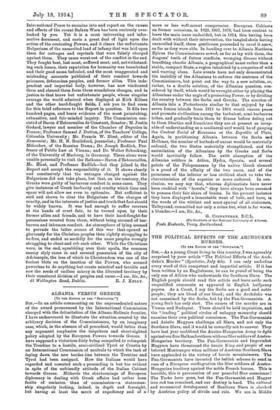ALBANIA VERSUS GREECE.
[To THE EDITOR OF THE " SPECTITOR."]
SIF,—In an article commenting on the unprecedented nature of the award pronounced by the International Commission charged with the delimitation of the Albano-Hellenic frontier, I have endeavoured to illustrate the situation created by the arbitrary decision of the Commissioners, by an imaginary case, which, in the absence of all precedent, would better than any argument emphasize the iniquitous and short-sighted policy adopted by the European Powers towards Greece. I have supposed a victorious Italy being compelled to relinquish the Trentino to a hostile, semi-civilized Tyrol or Croatia by an International Commission of neutrals to which the task of laying down the new border-line between the Trentino and Tyrol had been assigned. How the Italians would have regarded and resented such a proceeding is but too evident in spite of the unfriendly attitude of the Italian Cabinet towards Greece. Hitherto the shortcomings of European diplomacy in dealing with Greek affairs had rather been faults of omission than of commission—a statesman- ship singularly lacking, indeed, in depth and foresight, but having at least the merit of expediency and of a more or less well-meant compromise. European Cabinets on former occasions, in 1829, 1867, 1878, had been content to leave the main issue undecided, but in 1914, this having been dealt with without their intervention, the tangled skein having unravelled itself, these gentlemen proceeded to ravel it anew, as far as they were able. In banding over to Albania Northern Epirus the Commissioners sowed, as far as lay with them, the dragons' teeth of future conflicts, wronging Greece without benefiting chaotic Albania, a geographical name rather than a stable, compact State, a region inhabited by a congeries of wild and warring clans. Late events have not only demonstrated the inability of the Albanians to enforce the sentence of the Commissioners, but point out the way to a new solution, or, rather, to a double solution, of the Albanian question, con- sidered by itself, which would be wrought either by placing the Albanians under the aegis of a protecting Power, or by dividing the country between the Serbs and Greeks. The erection of Albania into a Protectorate similar to that enjoyed by the seven Ionian islands from 1815 to 1864 would ensure peace and promote civilization among the turbulent, semi-barbarous tribes, and gradually train them to fitness before doling out to them liberties and franchises they are at present as incap- able of understanding as a mediaeval serf would be of gauging the Contra Social of Rousseau or the Republic of Plato. Again, in partitioning Albania between the Serbs and Hellenes, the number• of hotbeds of unrest would be materially reduced, the two States materially strengthened, and the assimilation of the Albanians by the Greeks and Serbs would inevitably follow. The swift absorption of the Albanian settlers in Attica, Hydra, Spezzia, and several points of the Peloponnesus by the native Greek element is a proof of the affinity of the two races, and of the proneness of the inferior or less civilized stock to take the characteristics of the superior or more cultured. In con- clusion, we may say that, whereas diplomatists have never been credited with " bowels," they have always been assumed to possess their fair share of brains. In the present instance they have displayed a lamentable want of both, and have, in the words of the wittiest and most cynical of all statesmen, Talleyrand, committed not only a crime but, what is far worse, a blunder.—I am, Sir, &c., G. CIGNA:VERNE, B.C.L.
(Ex-Graduate of the National University of Athens).
Poste Bestante, Vevey, Switzerland.










































 Previous page
Previous page